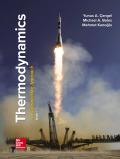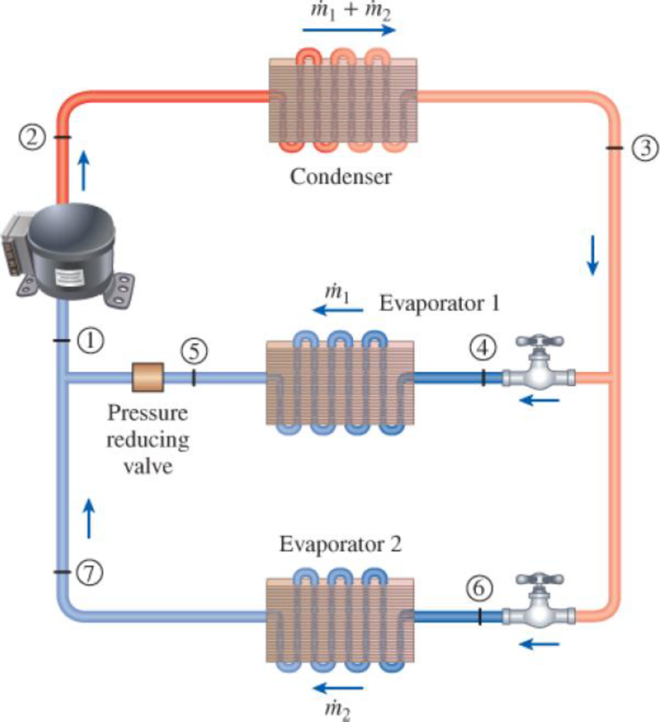
EBK THERMODYNAMICS: AN ENGINEERING APPR
9th Edition
ISBN: 8220106796979
Author: CENGEL
Publisher: YUZU
expand_more
expand_more
format_list_bulleted
Textbook Question
Chapter 11.10, Problem 62P
A two-evaporator compression refrigeration system as shown in Fig. P11–62 uses refrigerant-134a as the working fluid. The system operates evaporator 1 at 0°C, evaporator 2 at −26.4°C, and the condenser at 800 kPa. The refrigerant is circulated through the compressor at a rate of 0.1 kg/s, and the low-temperature evaporator serves a cooling load of 8 kW. Determine the cooling rate of the high-temperature evaporator, the power required by the compressor, and the COP of the system. The refrigerant is saturated liquid at the exit of the condenser and saturated vapor at the exit of each evaporator, and the compressor is isentropic.
FIGURE P11–62

Expert Solution & Answer
Want to see the full answer?
Check out a sample textbook solution
Students have asked these similar questions
this is an old practice exam, the answer is Ax = -4, Ay = -12,Az = 32.5, Bx= 34, Bz = 5, By = 0 but how?
This is an old practice exam, the answer is Ax = Az = 0, Ay = 2000, TDE = 4750, Cx = 2000, Cy = 2000, Cz = -800 but how?
this is an old practice exam, the answer is Fmin = 290.5lb but how
Chapter 11 Solutions
EBK THERMODYNAMICS: AN ENGINEERING APPR
Ch. 11.10 - Why do we study the reversed Carnot cycle even...Ch. 11.10 - Why is the reversed Carnot cycle executed within...Ch. 11.10 - A steady-flow Carnot refrigeration cycle uses...Ch. 11.10 - Refrigerant-134a enters the condenser of a...Ch. 11.10 - Does the ideal vapor-compression refrigeration...Ch. 11.10 - Why is the throttling valve not replaced by an...Ch. 11.10 - In a refrigeration system, would you recommend...Ch. 11.10 - Does the area enclosed by the cycle on a T-s...Ch. 11.10 - Consider two vapor-compression refrigeration...Ch. 11.10 - It is proposed to use water instead of...
Ch. 11.10 - The COP of vapor-compression refrigeration cycles...Ch. 11.10 - A 10-kW cooling load is to be served by operating...Ch. 11.10 - An ice-making machine operates on the ideal...Ch. 11.10 - An air conditioner using refrigerant-134a as the...Ch. 11.10 - An ideal vapor-compression refrigeration cycle...Ch. 11.10 - A refrigerator operates on the ideal...Ch. 11.10 - A refrigerator uses refrigerant-134a as the...Ch. 11.10 - An ideal vapor-compression refrigeration cycle...Ch. 11.10 - A refrigerator uses refrigerant-134a as its...Ch. 11.10 - A refrigerator uses refrigerant-134a as the...Ch. 11.10 - A commercial refrigerator with refrigerant-134a as...Ch. 11.10 - The manufacturer of an air conditioner claims a...Ch. 11.10 - Prob. 24PCh. 11.10 - How is the second-law efficiency of a refrigerator...Ch. 11.10 - Prob. 26PCh. 11.10 - Prob. 27PCh. 11.10 - Prob. 28PCh. 11.10 - Bananas are to be cooled from 28C to 12C at a rate...Ch. 11.10 - A vapor-compression refrigeration system absorbs...Ch. 11.10 - A room is kept at 5C by a vapor-compression...Ch. 11.10 - Prob. 32PCh. 11.10 - A refrigerator operating on the vapor-compression...Ch. 11.10 - When selecting a refrigerant for a certain...Ch. 11.10 - A refrigerant-134a refrigerator is to maintain the...Ch. 11.10 - Consider a refrigeration system using...Ch. 11.10 - A refrigerator that operates on the ideal...Ch. 11.10 - A heat pump that operates on the ideal...Ch. 11.10 - Do you think a heat pump system will be more...Ch. 11.10 - What is a water-source heat pump? How does the COP...Ch. 11.10 - A heat pump operates on the ideal...Ch. 11.10 - Refrigerant-134a enters the condenser of a...Ch. 11.10 - A heat pump that operates on the ideal...Ch. 11.10 - The liquid leaving the condenser of a 100,000...Ch. 11.10 - Reconsider Prob. 1144E. What is the effect on the...Ch. 11.10 - A heat pump using refrigerant-134a heats a house...Ch. 11.10 - A heat pump using refrigerant-134a as a...Ch. 11.10 - Reconsider Prob. 1148. What is the effect on the...Ch. 11.10 - Prob. 50PCh. 11.10 - How does the COP of a cascade refrigeration system...Ch. 11.10 - Consider a two-stage cascade refrigeration cycle...Ch. 11.10 - Can a vapor-compression refrigeration system with...Ch. 11.10 - Prob. 54PCh. 11.10 - A certain application requires maintaining the...Ch. 11.10 - Prob. 56PCh. 11.10 - Repeat Prob. 1156 for a flash chamber pressure of...Ch. 11.10 - Prob. 59PCh. 11.10 - A two-stage compression refrigeration system with...Ch. 11.10 - A two-stage compression refrigeration system with...Ch. 11.10 - A two-evaporator compression refrigeration system...Ch. 11.10 - A two-evaporator compression refrigeration system...Ch. 11.10 - Repeat Prob. 1163E if the 30 psia evaporator is to...Ch. 11.10 - Consider a two-stage cascade refrigeration cycle...Ch. 11.10 - How does the ideal gas refrigeration cycle differ...Ch. 11.10 - Prob. 67PCh. 11.10 - Devise a refrigeration cycle that works on the...Ch. 11.10 - How is the ideal gas refrigeration cycle modified...Ch. 11.10 - Prob. 70PCh. 11.10 - How do we achieve very low temperatures with gas...Ch. 11.10 - An ideal gas refrigeration system operates with...Ch. 11.10 - Air enters the compressor of an ideal gas...Ch. 11.10 - Repeat Prob. 1173 for a compressor isentropic...Ch. 11.10 - An ideal gas refrigeration cycle uses air as the...Ch. 11.10 - Rework Prob. 1176E when the compressor isentropic...Ch. 11.10 - A gas refrigeration cycle with a pressure ratio of...Ch. 11.10 - A gas refrigeration system using air as the...Ch. 11.10 - An ideal gas refrigeration system with two stages...Ch. 11.10 - Prob. 81PCh. 11.10 - Prob. 82PCh. 11.10 - What are the advantages and disadvantages of...Ch. 11.10 - Prob. 84PCh. 11.10 - Prob. 85PCh. 11.10 - Prob. 86PCh. 11.10 - Prob. 87PCh. 11.10 - Heat is supplied to an absorption refrigeration...Ch. 11.10 - An absorption refrigeration system that receives...Ch. 11.10 - An absorption refrigeration system receives heat...Ch. 11.10 - Heat is supplied to an absorption refrigeration...Ch. 11.10 - Prob. 92PCh. 11.10 - Prob. 93PCh. 11.10 - Consider a circular copper wire formed by...Ch. 11.10 - An iron wire and a constantan wire are formed into...Ch. 11.10 - Prob. 96PCh. 11.10 - Prob. 97PCh. 11.10 - Prob. 98PCh. 11.10 - Prob. 99PCh. 11.10 - Prob. 100PCh. 11.10 - Prob. 101PCh. 11.10 - Prob. 102PCh. 11.10 - A thermoelectric cooler has a COP of 0.18, and the...Ch. 11.10 - Prob. 104PCh. 11.10 - Prob. 105PCh. 11.10 - Prob. 106PCh. 11.10 - Rooms with floor areas of up to 15 m2 are cooled...Ch. 11.10 - Consider a steady-flow Carnot refrigeration cycle...Ch. 11.10 - Consider an ice-producing plant that operates on...Ch. 11.10 - A heat pump that operates on the ideal...Ch. 11.10 - A heat pump operates on the ideal...Ch. 11.10 - A large refrigeration plant is to be maintained at...Ch. 11.10 - Repeat Prob. 11112 assuming the compressor has an...Ch. 11.10 - An air conditioner with refrigerant-134a as the...Ch. 11.10 - A refrigerator using refrigerant-134a as the...Ch. 11.10 - Prob. 117RPCh. 11.10 - An air conditioner operates on the...Ch. 11.10 - Consider a two-stage compression refrigeration...Ch. 11.10 - A two-evaporator compression refrigeration system...Ch. 11.10 - The refrigeration system of Fig. P11122 is another...Ch. 11.10 - Repeat Prob. 11122 if the heat exchanger provides...Ch. 11.10 - An aircraft on the ground is to be cooled by a gas...Ch. 11.10 - Consider a regenerative gas refrigeration cycle...Ch. 11.10 - An ideal gas refrigeration system with three...Ch. 11.10 - Prob. 130RPCh. 11.10 - Derive a relation for the COP of the two-stage...Ch. 11.10 - Prob. 133FEPCh. 11.10 - Prob. 134FEPCh. 11.10 - Prob. 135FEPCh. 11.10 - Prob. 136FEPCh. 11.10 - Prob. 137FEPCh. 11.10 - An ideal vapor-compression refrigeration cycle...Ch. 11.10 - Prob. 139FEPCh. 11.10 - An ideal gas refrigeration cycle using air as the...Ch. 11.10 - Prob. 141FEPCh. 11.10 - Prob. 142FEP
Knowledge Booster
Learn more about
Need a deep-dive on the concept behind this application? Look no further. Learn more about this topic, mechanical-engineering and related others by exploring similar questions and additional content below.Similar questions
- This is an exam review question. The answer is Pmin = 622.9 lb but whyarrow_forwardPlease do not use any AI tools to solve this question. I need a fully manual, step-by-step solution with clear explanations, as if it were done by a human tutor. No AI-generated responses, please.arrow_forwardPlease do not use any AI tools to solve this question. I need a fully manual, step-by-step solution with clear explanations, as if it were done by a human tutor. No AI-generated responses, please.arrow_forward
- Please do not use any AI tools to solve this question. I need a fully manual, step-by-step solution with clear explanations, as if it were done by a human tutor. No AI-generated responses, please.arrow_forwardThis is an old practice exam. Fce = 110lb and FBCD = 62 lb but whyarrow_forwardQuiz/An eccentrically loaded bracket is welded to the support as shown in Figure below. The load is static. The weld size for weld w1 is h1 = 4mm, for w2 h2 = 6mm, and for w3 is h3 =6.5 mm. Determine the safety factor (S.f) for the welds. F=29 kN. Use an AWS Electrode type (E100xx). 163 mm S 133 mm 140 mm Please solve the question above I solved the question but I'm sure the answer is wrong the link : https://drive.google.com/file/d/1w5UD2EPDiaKSx3W33aj Rv0olChuXtrQx/view?usp=sharingarrow_forward
- Q2: (15 Marks) A water-LiBr vapor absorption system incorporates a heat exchanger as shown in the figure. The temperatures of the evaporator, the absorber, the condenser, and the generator are 10°C, 25°C, 40°C, and 100°C respectively. The strong liquid leaving the pump is heated to 50°C in the heat exchanger. The refrigerant flow rate through the condenser is 0.12 kg/s. Calculate (i) the heat rejected in the absorber, and (ii) the COP of the cycle. Yo 8 XE-V lo 9 Pc 7 condenser 5 Qgen PG 100 Qabs Pe evaporator PRV 6 PA 10 3 generator heat exchanger 2 pump 185 absorberarrow_forwardQ5:(? Design the duct system of the figure below by using the balanced pressure method. The velocity in the duct attached to the AHU must not exceed 5m/s. The pressure loss for each diffuser is equal to 10Pa. 100CFM 100CFM 100CFM ☑ ☑ 40m AHU -16m- 8m- -12m- 57m 250CFM 40m -14m- 26m 36m ☑ 250CFMarrow_forwardA mass of ideal gas in a closed piston-cylinder system expands from 427 °C and 16 bar following the process law, pv1.36 = Constant (p times v to the power of 1.36 equals to a constant). For the gas, initial : final pressure ratio is 4:1 and the initial gas volume is 0.14 m³. The specific heat of the gas at constant pressure, Cp = 0.987 kJ/kg-K and the specific gas constant, R = 0.267 kJ/kg.K. Determine the change in total internal energy in the gas during the expansion. Enter your numerical answer in the answer box below in KILO JOULES (not in Joules) but do not enter the units. (There is no expected number of decimal points or significant figures).arrow_forward
- my ID# 016948724. Please solve this problem step by steparrow_forwardMy ID# 016948724 please find the forces for Fx=0: fy=0: fz=0: please help me to solve this problem step by steparrow_forwardMy ID# 016948724 please solve the proble step by step find the forces fx=o: fy=0; fz=0; and find shear moment and the bending moment diagran please draw the diagram for the shear and bending momentarrow_forward
arrow_back_ios
SEE MORE QUESTIONS
arrow_forward_ios
Recommended textbooks for you
 Refrigeration and Air Conditioning Technology (Mi...Mechanical EngineeringISBN:9781305578296Author:John Tomczyk, Eugene Silberstein, Bill Whitman, Bill JohnsonPublisher:Cengage Learning
Refrigeration and Air Conditioning Technology (Mi...Mechanical EngineeringISBN:9781305578296Author:John Tomczyk, Eugene Silberstein, Bill Whitman, Bill JohnsonPublisher:Cengage Learning Principles of Heat Transfer (Activate Learning wi...Mechanical EngineeringISBN:9781305387102Author:Kreith, Frank; Manglik, Raj M.Publisher:Cengage Learning
Principles of Heat Transfer (Activate Learning wi...Mechanical EngineeringISBN:9781305387102Author:Kreith, Frank; Manglik, Raj M.Publisher:Cengage Learning

Refrigeration and Air Conditioning Technology (Mi...
Mechanical Engineering
ISBN:9781305578296
Author:John Tomczyk, Eugene Silberstein, Bill Whitman, Bill Johnson
Publisher:Cengage Learning

Principles of Heat Transfer (Activate Learning wi...
Mechanical Engineering
ISBN:9781305387102
Author:Kreith, Frank; Manglik, Raj M.
Publisher:Cengage Learning
The Refrigeration Cycle Explained - The Four Major Components; Author: HVAC Know It All;https://www.youtube.com/watch?v=zfciSvOZDUY;License: Standard YouTube License, CC-BY